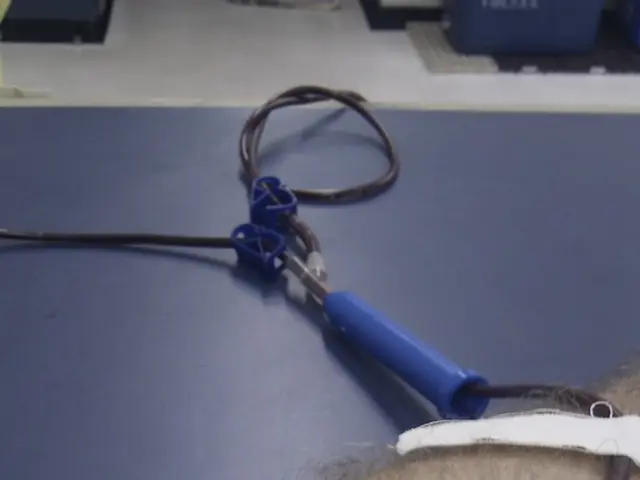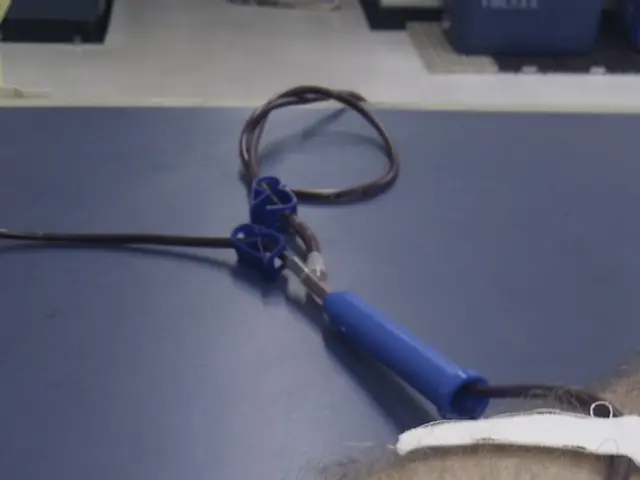Recognize Potential Indications of Prostate Cancer: A Guide
Men, pay heed to potential warning signs of prostate cancer as this common male cancer can be treatable when detected early. While the prostate gland is small, roughly walnut-sized, it can cause significant issues if left uncared for.
Cleveland Clinic, a renowned non-profit academic medical center, underscores the importance of being vigilant. Urologist Christopher Weight, M.D., emphasizes that early symptoms of prostate cancer often remain unnoticed, but if specific warning signs emerge, it's advisable to seek the expertise of a urologist.
Some common symptoms associated with prostate cancer include:
- Altered urine flow: Difficulty starting urination, slow flow, or dribbling. In extreme cases, the flow may even stop temporarily. Benign prostatic hyperplasia (BPH) is a common cause, but it's essential to get a prostate check if you experience these symptoms.
- Frequent urination: An intense and sometimes urgent need to urinate, particularly at night, may signal nerve damage, an infection, or a tumor pressing on the bladder and urethra.
- Painful or burning urination: Often linked to a urinary tract infection (UTI), but in some cases, this could also indicate prostate cancer.
- Blood in urine: This could be a warning sign of prostate cancer, although it can also be associated with other health issues, such as a UTI.
- Prostate pain: Unexplained prostate discomfort, particularly while sitting, might indicate underlying issues, including prostate cancer. However, it's advisable to consult a urologist for confirmation.
- Loss of bladder or bowel control: Changes in bladder or bowel control could signal prostate cancer, although there are numerous other causes as well.
- Changes in sexual function: Pain during ejaculation, decreased ejaculate volume, difficulty maintaining an erection, or blood in semen can be signs of prostate cancer, though they can also stem from numerous other causes.
Advanced symptoms of prostate cancer—when it has spread—may include ongoing pain in the lower back, hips, or chest, as well as numbness in the legs or feet.
Regular prostate cancer screenings for men between the ages of 55 and 69, or earlier if at-risk, are crucial for early detection and effective treatment. A simple blood test, often followed by a physical examination if needed, provides valuable information about your prostate health.
Though some risk factors for prostate cancer are unavoidable—such as age or family history—maintaining a healthy lifestyle can support a healthier prostate. Regular prostate screenings, weight management, regular exercise, a balanced diet, and smoking cessation can all contribute to lowering the risk of prostate cancer.
Dr. Weight explains that when prostate cancer is diagnosed before it spreads, approximately 99% of patients survive at least five years after diagnosis. However, the survival rate significantly drops if the cancer has spread.
Remaining proactive through regular screenings, maintaining healthy habits, and paying attention to changes in the body can make a significant difference in long-term outcomes. Men are encouraged to speak with a healthcare provider about the most appropriate screening schedule and plan.
- Recognizing the importance of early detection, men should be vigilant about potential warning signs of prostate cancer, as it can be treatable when diagnosed early.
- Some common symptoms associated with prostate cancer include alterations in urine flow, frequent urination, painful or burning urination, blood in urine, prostate pain, changes in bladder or bowel control, and changes in sexual function.
- Regular prostate cancer screenings, particularly for men aged 55 to 69, or earlier if at-risk, are crucial for early detection and better treatment outcomes.
- Maintaining a healthy lifestyle, including regular exercise, weight management, a balanced diet, and smoking cessation, can help lower the risk of prostate cancer and contribute to overall prostate health.








